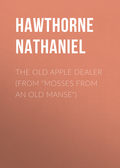
Натаниель Готорн
The Three Golden Apples
Six legs, and one gigantic body! Certainly, he must have been a very queer monster to look at; and, my stars, what a waste of shoe-leather!
When the stranger had finished the story of his adventures, he looked around at the attentive faces of the maidens.
“Perhaps you may have heard of me before,” said he, modestly. “My name is Hercules!”
“We had already guessed it,” replied the maidens; “for your wonderful deeds are known all over the world. We do not think it strange, any longer, that you should set out in quest of the golden apples of the Hesperides. Come, sisters, let us crown the hero with flowers!”
Then they flung beautiful wreaths over his stately head and mighty shoulders, so that the lion’s skin was almost entirely covered with roses. They took possession of his ponderous club, and so entwined it about with the brightest, softest, and most fragrant blossoms, that not a finger’s breadth of its oaken substance could be seen. It looked all like a huge bunch of flowers. Lastly, they joined hands, and danced around him, chanting words which became poetry of their own accord, and grew into a choral song, in honor of the illustrious Hercules.
And Hercules was rejoiced, as any other hero would have been, to know that these fair young girls had heard of the valiant deeds which it had cost him so much toil and danger to achieve. But, still, he was not satisfied. He could not think that what he had already done was worthy of so much honor, while there remained any bold or difficult adventure to be undertaken.
“Dear maidens,” said he, when they paused to take breath, “now that you know my name, will you not tell me how I am to reach the garden of the Hesperides?”
“Ah! must you go so soon?” they exclaimed. “You – that have performed so many wonders, and spent such a toilsome life – cannot you content yourself to repose a little while on the margin of this peaceful river?”
Hercules shook his head.
“I must depart now,” said he.
“We will then give you the best directions we can,” replied the damsels. “You must go to the sea-shore, and find out the Old One, and compel him to inform you where the golden apples are to be found.”
“The Old One!” repeated Hercules, laughing at this odd name. “And, pray, who may the Old One be?”
“Why, the Old Man of the Sea, to be sure!” answered one of the damsels. “He has fifty daughters, whom some people call very beautiful; but we do not think it proper to be acquainted with them, because they have sea-green hair, and taper away like fishes. You must talk with this Old Man of the Sea. He is a sea-faring person, and knows all about the garden of the Hesperides; for it is situated in an island which he is often in the habit of visiting.”
Hercules then asked whereabouts the Old One was most likely to be met with. When the damsels had informed him, he thanked them for all their kindness, – for the bread and grapes with which they had fed him, the lovely flowers with which they had crowned him, and the songs and dances wherewith they had done him honor, – and he thanked them, most of all, for telling him the right way, – and immediately set forth upon his Journey.
But, before he was out of hearing, one of the maidens called after him.
“Keep fast hold of the Old-One, when you catch him!” cried she, smiling, and lifting her finger to make the caution more impressive. “Do not be astonished at anything that may happen. Only hold him fast, and he will tell you what you wish to know.”
Hercules again thanked her, and pursued his way, while the maidens resumed their pleasant labor of making flower-wreaths. They talked about the hero, long after he was gone.
“We will crown him with the loveliest of our garlands,” said they, “when he returns hither with the three golden apples, after slaying the dragon with a hundred heads.”
Meanwhile, Hercules travelled constantly onward, over hill and dale, and through the solitary woods. Sometimes he swung his club aloft, and splintered a mighty oak with a downright blow. His mind was so full of the giants and monsters with whom it was the business of his life to fight, that perhaps he mistook the great tree for a giant or a monster. And so eager was Hercules to achieve what he had undertaken, that he almost regretted to have spent so much time with the damsels, wasting idle breath upon the story of his adventures. But thus it always is with persons who are destined to perform great things. What they have already done seems less than nothing. What they have taken in hand to do seems worth toil, danger, and life itself.
Persons who happened to be passing through the forest must have been affrighted to see him smite the trees with his great club. With but a single blow, the trunk was riven as by the stroke of lightning, and the broad boughs came rustling and crashing down.
Hastening forward, without ever pausing or looking behind, he by and by heard the sea roaring at a distance. At this sound, he increased his speed, and soon came to a beach, where the great surf-waves tumbled themselves upon the hard sand, in a long line of snowy foam. At one end of the beach, however, there was a pleasant spot, where some green shrubbery clambered up a cliff, making its rocky face look soft and beautiful. A carpet of verdant grass, largely intermixed with sweet-smelling clover, covered the narrow space between the bottom of the cliff and the sea. And what should Hercules espy there, but an old man, fast asleep!
But was it really and truly an old man? Certainly, at first sight, it looked very like one; but, on closer inspection, it rather seemed to be some kind of a creature that lived in the sea. For, on his legs and arms there were scales, such as fishes have; he was web-footed and web-fingered, after the fashion of a duck; and his long beard, being of a greenish tinge, had more the appearance of a tuft of sea-weed than of an ordinary beard. Have you never seen a stick of timber, that has been long tossed about by the waves, and has got all overgrown with barnacles, and, at last drifting ashore, seems to have been thrown up from the very deepest bottom of the sea? Well, the old man would have put you in mind of just such a wave-tost spar! But Hercules, the instant he set eyes on this strange figure, was convinced that it could be no other than the Old One, who was to direct him on his way.
Yes; it was the selfsame Old Man of the Sea, whom the hospitable maidens had talked to him about. Thanking his stars for the lucky accident of finding the old fellow asleep, Hercules stole on tiptoe towards him, and caught him by the arm and leg.
“Tell me,” cried he, before the Old One was well awake, “which is the way to the garden of the Hesperides?”
As you may easily imagine, the Old Man of the Sea awoke in a fright. But his astonishment could hardly have been greater than was that of Hercules, the next moment. For, all of a sudden, the Old One seemed to disappear out of his grasp, and he found himself holding a stag by the fore and hind leg! But still he kept fast hold. Then the stag disappeared, and in its stead there was a sea-bird, fluttering and screaming, while Hercules clutched it by the wing and claw! But the bird could not get away. Immediately afterwards, there was an ugly three-headed dog, which growled and barked at Hercules, and snapped fiercely at the hands by which he held him! But Hercules would not let him go. In another minute, instead of the three-headed dog, what should appear but Geryon, the six-legged man-monster, kicking at Hercules with five of his legs, in order to get the remaining one at liberty! But Hercules held on. By and by, no Geryou was there, but a huge snake, like one of those which Hercules had strangled in his babyhood, only a hundred times as big, and it twisted and twined about the hero’s neck and body, and threw its tail high into the air, and opened its deadly jaws as if to devour him outright; so that it was really a very terrible spectacle! But Hercules was no whit disheartened, and squeezed the great snake so tightly that he soon began to hiss with pain.
You must understand that the Old Man of the Sea, though he generally looked so much like the wave-beaten figure-head of a vessel, had the power of assuming any shape he pleased. When he found himself so roughly seized by Hercules, he had been in hopes of putting him into such surprise and terror, by these magical transformations, that the hero would be glad to let him go. If Hercules had relaxed his grasp, the Old One would certainly have plunged down to the very bottom of the sea, whence he would not soon have given himself the trouble of coming up, in order to answer any impertinent questions. Ninety-nine people out of a hundred, I suppose, would have been frightened out of their wits by the very first of his ugly shapes, and would have taken to their heels at once. For, one of the hardest things in this world is, to see the difference between real dangers and imaginary ones.
But, as Hercules held on so stubbornly, and only squeezed the Old One so much the tighter at every change of shape, and really put him to no small torture, he finally thought it best to reappear in his own figure. So there he was again, a fishy, scaly, webfooted sort of personage, with something like a tuft of sea-weed at his chin.
“Pray, what do you want with me?” cried the Old One, as soon as he could take breath; for it is quite a tiresome affair to go through so many false shapes. “Why do you squeeze me so hard? Let me go, this moment, or I shall begin to consider you an extremely uncivil person!”







